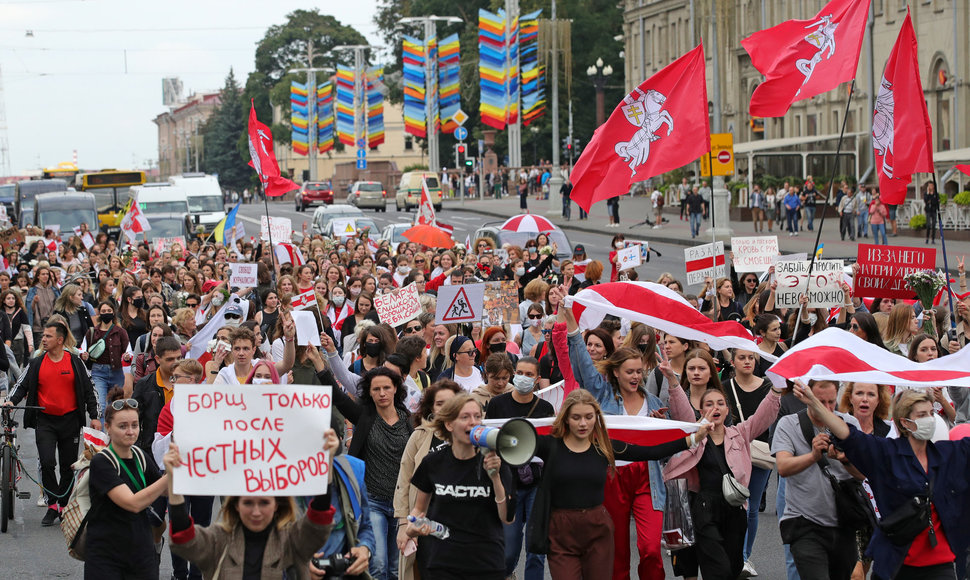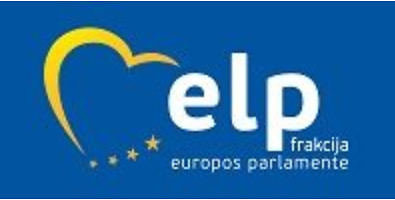However, on the other hand, it is clear that both in A. Lukashenko’s circle and his supporter, the Kremlin, there’s a great deal of worry that even after two months, the regime’s brutal pressure has been unable to suppress, or weaken the street protests.
With almost two months gone by now, it is due time to identify more clearly what key factors will decide the dynamics of events in Belarus going forward. At the same time, it is an opportunity to also say a few words about how, in this future dynamic, the visit by French President E. Macron to Lithuania and his meeting with S. Tsikhanouskaya is important.
I see three key factors, which will decide the next dynamics of the revolution in Belarus: protests on Belarussian city streets, Putin’s support for Lukashenko, and the West’s ability to exert influence on the first two factors – both the situation in Belarus and Putin’s support to Lukashenko.
The power of protests in Minsk
Everyone who is interested, and who cares, will know of the protests on the Belarussian city streets. There’s little new to add, and what they have been able to achieve thus far is a historic miracle. It is a completely new type of democratic revolution, you could even describe it as an online revolution, and it is one which even now needs neither traditional political leaders nor lengthy programme speeches to lay out the revolution’s goals. This is why it is very difficult to dismantle. It is its strength, not a weakness. The peaceful nature of the revolution, its democratic and not geopolitical purpose is also a strength, not a weakness because Belarussians have to discover the very narrow path toward the victory of democracy, which the Kremlin would have no public pretext to quash.
Just as the Lithuania’s Reform movement Sąjūdis once claimed, it is in favour of Gorbachev’s Perestroika, which would gradually lead to complete Independence. Through its energy of peaceful protest, the Belarussian revolution has inspired in the Western world an energy of solidarity, and now through concrete actions, the West must aid the revolution in maintaining its energy over a longer period, just like the Lithuania’s Reform movement Sąjūdis managed to convince many people in the West to marvel at Lithuania’s peaceful revolution, and how every favourable word or action from the West would inspire us to further action.
The Putin factor
Putin’s support for Lukashenko is also a well-known factor. It is the only factor due to which Lukashenko still lingers without withdrawing. The fact that Putin is supporting Lukashenko is also no surprise to anyone. It would be odd and unexpected if Putin would have supported a democratic revolution in Belarus from the get-go, however, in the long run, such support by Putin might have recognisable geopolitical consequences for Lukashenko, which the Kremlin will definitely not be happy with. The Belarussian people will turn away not only from Lukashenko (which they have displayed already), they will also turn ever more from Putin, the Kremlin and likely all of Russia in the exact same way as when in 2014 in Ukraine, Putin chose to back Yanukovych, not the Ukrainian people. This way, ‘thanks to’ Putin, a pro-Western Ukraine emerged. Equally, a pro-Western Belarus could appear if Putin fails to realise for a long time just how toxic his support for Lukashenko seems to Belarussians.
That Lukashenko is lingering and not stepping down thanks to Putin’s support is an important factor. It might even be the most important because Putin holds the keys to the door that Lukashenko will have to withdraw through, and it would be unwise to disregard such a factor. As such, it comes as no surprise at all that the leaders of the Belarussian Coordination Council, and even S. Tsikhanouskaya, herself say that they expect that Putin will have enough wisdom to refuse to unconditionally support Lukashenko.
It is clear that Putin is in no rush to make use of the key and open the door for Lukashenko’s withdrawal. One can only guess at what price Putin is demanding. For Belarus’ geopolitical association with Russia to be unchanged? For the West to forget Putin’s ‘sins’ in Ukraine? Or perhaps that the West would welcome Putin back into its embrace? We cannot know the answers to these questions, but it is clear that only the other two factors can influence Putin, namely: a) protests on the streets of Minsk where there will be increasingly many anti-Putin posters; b) consistent efforts by the West to convince Putin that he will be better off if he will convince Lukashenko to step down.
There’s no need to be surprised that unpleasant work must be undertaken with this question, and that efforts must be made to convince Putin. Gorbachev did not want to recognise Lithuanian Independence for a long time either, and we had to ask and convince Western leaders to exert pressure on him. While concerned with Gorbachev’s stability, they were unable to withstand the pressure of their countries’ parliamentarians and news media who supported Lithuanian Independence, and thus, George H. W. Bush, only when pressured by the US Congress, was forced to discretely convince Gorbachev to lift the energy blockade of Lithuania in summer 1990.
It is clear that Putin is no Gorbachev, and it is also clear that the current Kremlin regime is far more brutal and cynical than the Kremlin regime prior to the fall of the empire.
However, the contemporary Kremlin regime has weaknesses, and major weaknesses they are. Firstly, it is evident that the periphery of Putin’s empire is experiencing ever more difficulties containing fires: in one corner, there’s a democratic revolution in Belarus; in another, there’s the unabating Khabarovsk, which might be joined by Novosibirsk, Irkutsk and Tomsk, all of which need only a spark. Then to the South, Kremlin’s traditional spheres of influence in Armenia and Azerbaijan are ever more resolutely encroached by Turkey, which makes no effort to hide its post-imperial ambitions.
This situation opens new opportunities for the West to talk to Putin, not with a pandering voice, but one that formulates clear alternatives for him.
The Western factor
Unlike Putin, the West supports the people of Belarus. Nevertheless, the West doesn’t have much leverage to impact Lukashenko’s decisions because he depends on solely Putin’s support. However, the West has options of speaking to Putin, and also of convincing him to cease supporting Lukashenko.
I will discuss the relationship between the West and Putin in this regard a little later because at first, we must realise that the West is particularly important for the first factor as well, namely the people’s protests on Belarussian city streets. During the Sąjūdis era, we would be waiting for every message from the West of support for our aims. Today, the Belarussian people await the same.
There are things the West can do immediately, even if it can’t come to terms on sanctions against 40 of the regime’s leaders who will be little concerned by those sanctions anyway. In the near future, the European Parliament could initiate an international investigation into the OMON’s crimes. With the Baltic States also applying Magnitsky sanction mechanisms and employing the Schengen Zone rules, visa-ban sanctions could be imposed on the hundreds or thousands of OMON officers found on the Traikovski list. The European Parliament could appoint a high-level former presidential mission, similar to the previously formed Kwasniewski/Cox mission to resolve the Ukraine crisis, and through the efforts of the EU, real preparations could begin on a Marshal Plan to support the economy of a democratic Belarus.
It is important that all this be done right now, not at some point in the future.
And most importantly, the West could convince Putin if the West were to come to a belief that this period marks not only the end of Lukashenko, but also a very notable stage of the waning of Putin’s power.
On the other hand, based on geopolitical logic, it is far more worthwhile for Putin to remove Lukashenko at some point and almost become a ‘hero’ in the eyes of a new, democratic Belarus. This would hence form a foundation to retain at least in the near future at least some influence on the development of a new, democratic Belarus’ political development, rather than cling to Lukashenko and alongside him, smear himself not only in the eyes of Belarussians but also the entire West.
***************
Here, it is necessary to say a few words about the meaning and significance of E. Macron’s recent visit to Lithuania. While officially it is declared that the French president visited Lithuania at the invitation of G. Nausėda, one can guess that the main goal of the visit was to meet with S. Tsikhanouskaya. All this was concealed beneath a gallant French diplomatic formula that he is meeting with S. Tsikhanouskaya only because upon arriving in Vilnius, he received her request and not because this was from the get-go the most important goal of this visit.
However, E. Macron has already received a public request from S. Tsikhanouskaya to be an intermediary in discussions with Putin in discussions regarding Lukashenko’s withdrawal. And it is a logical request, which is crucial for the future dynamics of Belarus’ revolution.
E. Macron also demonstrated that he is prepared for such a role, and announced ahead of time in the media that A. Lukashenko must step down. With A. Merkel planning her withdrawal from major politics, E. Macron is demonstrating his resolve and leadership in resolving the great problems of the European continent.
E. Macron has ambitions and energy to implement such ‘grand’ narratives. One can suspect that he is truly prepared to convince Putin regarding Lukashenko’s withdrawal by explaining to Putin that this is the only way E. Macron’s greatest narrative of returning Russia into the embrace of Europe can be implemented. This is because, in order to achieve it, Putin must play the role of ‘good cop’ in removing Lukashenko.
One can have great doubts about E. Macron’s plan to return Putin to the European fold, but if the French president’s efforts in this direction can help the Belarussian democratic revolution be realised, E. Macron can only be applauded for it. Because a victory of democracy in Belarus, despite how it might develop in the near future, this would have vast geopolitical consequences first and foremost for the further development of Russia itself. And for the sake of this, it is worthwhile creating opportunities for Macron to heroically fight for his ’grand narratives.’ It’s just important that in the Kremlin, he would defend the core interest of the Belarussian people – first, new elections, and only afterwards a new Constitution and not the contrary – trying to convince the Belarussian people to accept the Lavrov/Lukashenko scheme – first a new Constitution over two years, and only then new elections.
******
The importance of each of the three factors, which will decide the further dynamic of Belarus’ revolution – the Belarussian people’s protest, the Kremlin’s support for Lukashenko and the West’s support for the Belarussian people – is exceptional and intertwined.
The West can play an exceptional role, but only if in the near future, it will exit its typical inactive concerned” state.
Lithuania’s task is as follows: not to race with declarations of ‘concern’ and instead seek new opportunities for real actions. And not only at the level of Lithuania, but that of the entire West.
E. Macron’s visit to Lithuania is an example of such actions. And it is not all that important how exactly the idea for such a visit was born.
This article first appeared in the Lithuania Tribune













